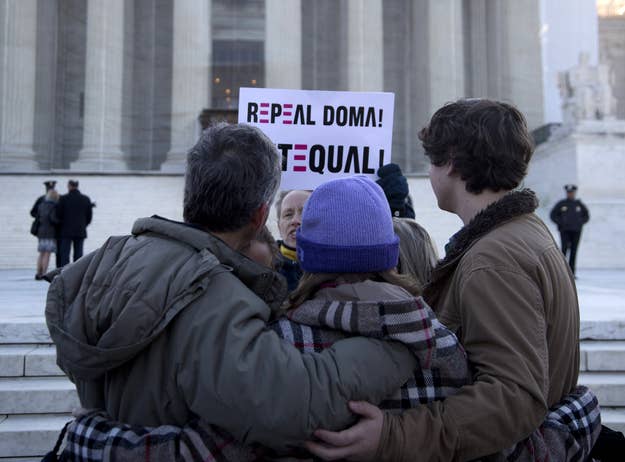
WASHINGTON — A majority of Supreme Court justices Wednesday appeared ready to declare unconstitutional the Defense of Marriage Act's definition of marriage for federal purposes as limited to one man and one woman.
Noting that a same-sex couple could be married in a state but remain unable to retrieve any of the multitude of federal marriage benefits, Justice Ruth Bader Ginsburg asked Paul Clement, who was defending the law on behalf of the House Bipartisan Legal Advisory Group, "What kind of marriage is this?"
Justice Anthony Kennedy appeared ready to side with the court's more liberal members, noting that the more than 1,100 federal marriage benefits showed the 1996 law's definitions affected the many ways the federal government is "intertwined with the daily lives" of couples married under state law.
Although the justices spent the first half of Wednesday's argument discussing whether the court had jurisdiction to hear the case, few justices signaled any discomfort with deciding the underlying constitutional questions raised by the case.
Edith Windsor's case was filed Nov. 9, 2010, and, though not the first challenge to the law, it was the one that the justices chose to review. Both the trial court and court of appeals agreed with Windsor, at which point the decision was appealed, setting up Wednesday's review.
The case traversed an interesting path, having been one of the two cases that led Attorney General Eric Holder to announce on Feb. 23, 2011, that he and President Obama had determined that Section 3 of DOMA was unconstitutional and that, accordingly, the administration would no longer be defending DOMA in court challenges. That move left the House Bipartisan Legal Advisory Group, controlled 3-2 by the Republican leadership, to take up that defense.
It was that defense — and the impact of the Obama administration's decision not to defend the law — that was the subject of the first half of today's argument. The latter half, more expectedly, focused on the question of whether DOMA's marriage definition is constitutional.
As Windsor told BuzzFeed earlier this year, "The idea that I might be a piece of history blows my mind. I think it's kind of wonderful that I'm getting my chance to really ask for justice, and I suspect I'll get it."
